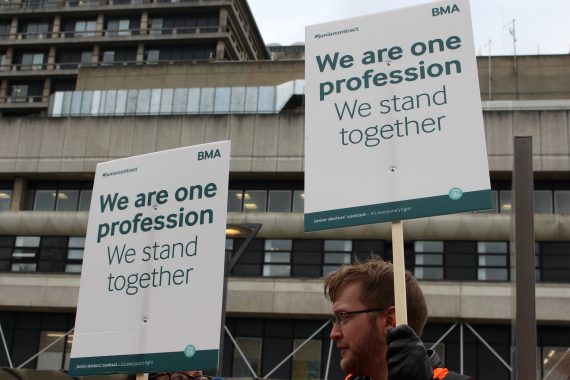Junior doctors to withdraw emergency care in escalation of action

Junior doctors will fully withdraw their labour, including emergency care, in an escalation of their industrial action, the BMA has announced – the first instance of this ever happening in the NHS.
A statement from the BMA said that the 48-hour industrial action planned for 26 April will now change to full withdrawal of labour between 8am and 5pm on 26 and 27 April.
This will follow earlier action – a 48-hour walkout on 6 April – which will continue as planned.
The chair of the BMA’s junior doctor committee Dr Johann Malawana said the Government had left them with ‘no choice’.
The committee had planned earlier this year to withdraw all emergency cover, but did not go through with the action as talks with the Government were progressing.
Junior doctors have already held a 48-hour strike since the imposition of the junior doctor contract, with two more planned for early and late April.
The BMA is also taking the Government to judicial review over the ‘embarrassing’ revelation that the Government failed to carry out an equality impact assessment before imposing a new contract on junior doctors in England.
Dr Malawana said today: ’No junior doctor wants to take this action but the Government has left us with no choice. In refusing to lift imposition and listen to junior doctors’ outstanding concerns, the Government will bear direct responsibility for the first full walkout of doctors in this country.
’The Government is refusing to get back around the table and is ploughing ahead with plans to impose a contract junior doctors have no confidence in and have roundly rejected.
’We want to end this dispute through talks but the Government is making this impossible, it is flatly refusing to engage with junior doctors, has done nothing to halt industrial action and is wilfully ignoring the mounting chorus of concerns over its plans to impose coming from doctors, patients and senior NHS managers. Faced with this reality what else can junior doctors do?’
Health secretary Jeremy Hunt last month announced that he was imposing a contract on junior doctors after talks broke down over the issue of evening and weekend pay, with the Government refusing to step back from its decision to remove ‘unsociable hours’ pay premiums from Saturdays and weekday evenings.
A Department of Health spokesperson said: ’This escalation of industrial action by the BMA is both desperate and irresponsible – and will inevitably put patients in harm’s way.
’If the BMA had agreed to negotiate on Saturday pay, as they promised to do through ACAS in November, we’d have a negotiated agreement by now – instead, we had no choice but to proceed with proposals recommended and supported by NHS leaders.’
What the imposed contract includes
The junior doctor contract imposed by health secretary Jeremy Hunt includes:
- An increase in basic pay of 13.5%;
- Redefining the definition of ‘plain time’ to include Saturday from 7am to 5pm;
- Paying a premium of 30% for Saturday ‘plain time’ working, if the doctor works one in four weekends;
- Reduce the definition of ‘safe hours’ from 91 to 72 hours a week;
- Doctors will not work more than four consecutive nights – down from seven currently;
- The maximum number of consecutive ‘long days’ will be reduced from seven to five;
- A new ‘Guardian’ role will be introduced, with the authority to impose fines for breaches to agreed working hours, which will be invested in educational resources and facilities for trainees.
Pulse October survey
Take our July 2025 survey to potentially win £1.000 worth of tokens










